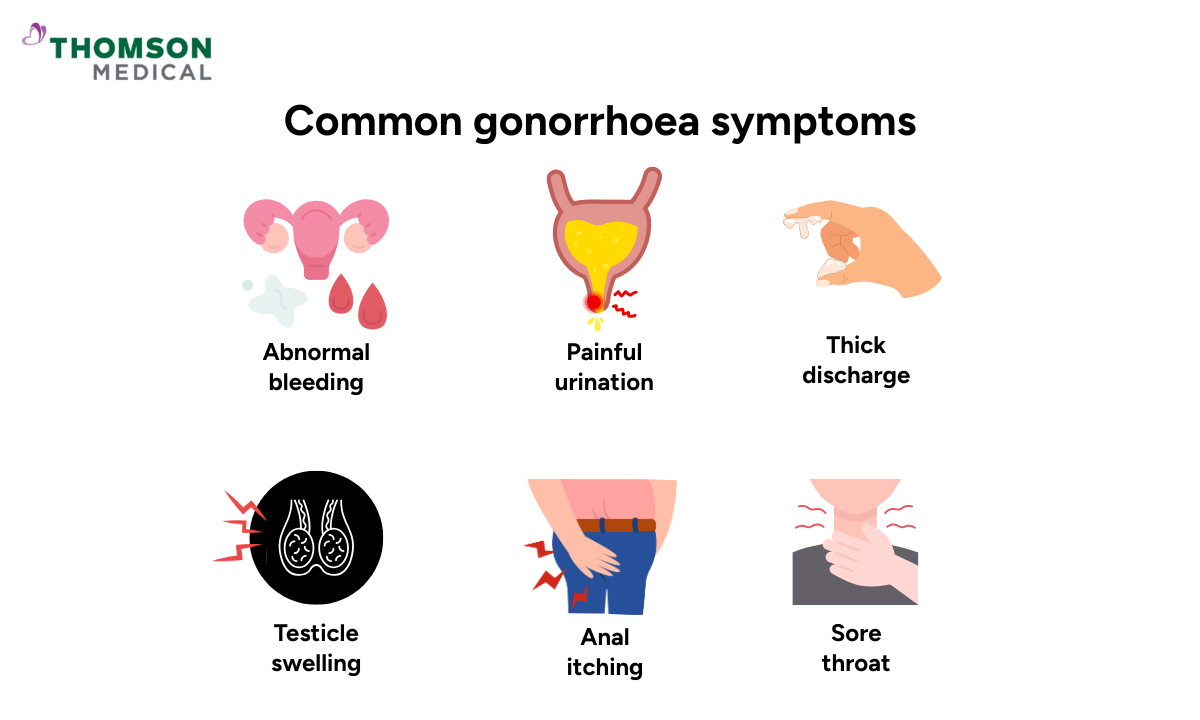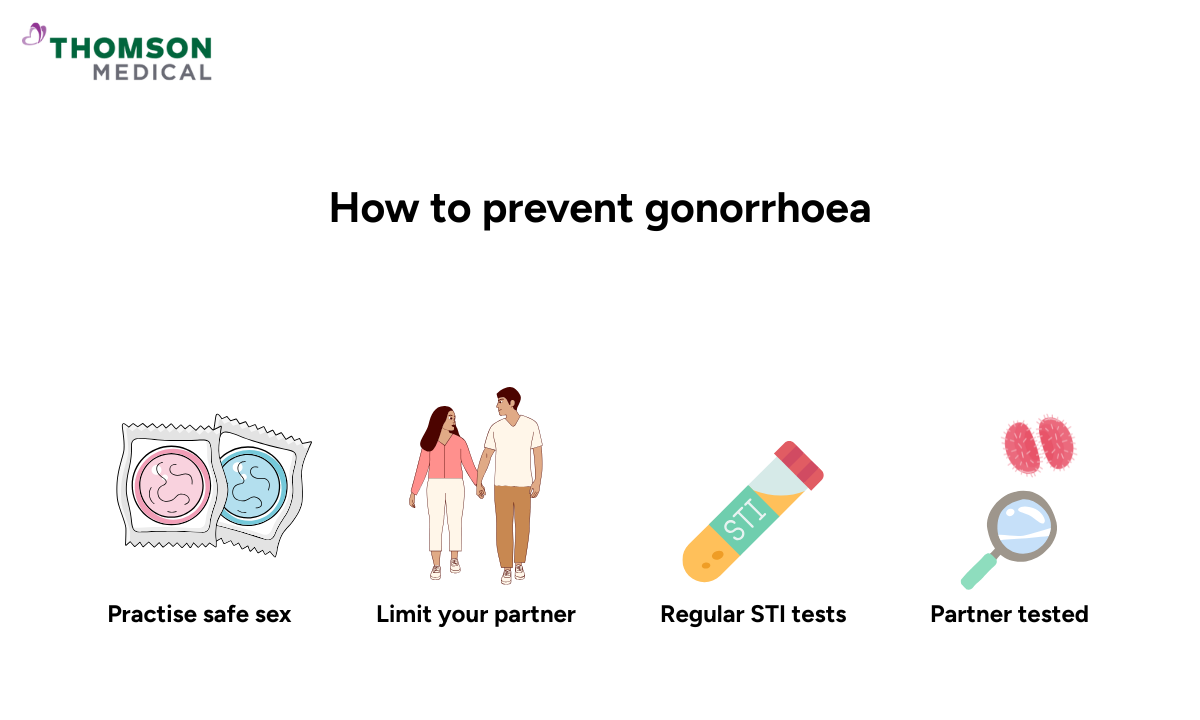Discovering that you might need a gonorrhoea test can feel worrying, but it’s actually a responsible step towards protecting your health and the people you love. Gonorrhoea is one of the most common sexually transmitted infections (STIs) in Singapore and around the world.
However, the good news is that it’s easily treatable when detected early. Getting tested not only protects your health but also prevents the transmission of the disease to others.
What is gonorrhoea?
Gonorrhoea is a common sexually transmitted infection caused by a bacterium called Neisseria gonorrhoeae. You can get it by having unprotected vaginal, anal, or oral intercourse, and it can infect the genitals, throat, and rectum. Anyone who is sexually active can get gonorrhoea. However, the risk is higher for people who have lots of sexual partners, do not use condoms all the time, or have a sexually transmitted infection (STI) now or in the past.
Common symptoms include a burning feeling or pain when you pee, unusual liquid coming out of your penis or vagina, and pain in your pelvis or genital area. But some people may not have any symptoms, which is why it's important to get tested regularly.
If left untreated, gonorrhoea can lead to serious complications. These include pelvic inflammatory disease (PID), infertility, or ectopic pregnancy in women. The infection can also be passed from mother to baby during childbirth.
However, gonorrhoea is easily diagnosed and treated with antibiotics. The best way to avoid getting an infection is to make sure you have safe sex. This means using a condom every time you’re having an intercourse and getting tested for STIs regularly.
Gonorrhoea symptoms

The symptoms of gonorrhoea can vary depending on where the infection occurs. Some people may not experience any noticeable signs at all. It's common for STIs not to cause any symptoms, which is why regular testing is important for catching them early.
Symptoms in women
Women with gonorrhoea may experience:
Thick green or yellow vaginal discharge with an unpleasant smell
Pain or burning sensation when passing urine
Lower abdominal or pelvic pain
Vaginal bleeding between periods or after sexual intercourse
Pain during sexual intercourse
Anal itching or discharge (after anal intercourse)
Sore throat (after oral intercourse)
Symptoms in men
Men with gonorrhoea may experience:
Burning or painful urination
Thick yellow or green discharge from the penis
Pain or swelling in the testicles
Anal itching or discharge (after anal intercourse)
Sore throat (after oral intercourse)
Early testing and treatment can help protect your health and prevent complications. If you notice any of these symptoms, you may request an appointment with Thomson Medical to learn more about available sexual health services.
Our sexual health specialist
Loading...
When to get tested for gonorrhoea?
You should consider getting tested for gonorrhoea if you have any symptoms, such as unusual discharge, pain during urination, or pelvic discomfort. But, as many people don't show any symptoms, it's also important to get tested if you've had unprotected sexual intercourse, have lots of different partners, or if your partner has been diagnosed with an STI.
You should also get tested if you are starting a new sexual relationship, are pregnant, or are worried about possible exposure. Regular check-ups can help spot infections early, even when you don't have any symptoms.
Gonorrhoea test in Singapore
In Singapore, gonorrhoea testing is available at several private clinics. These clinics usually provide quick tests called polymerase chain reaction (PCR) tests. These are also known as nucleic acid amplification tests (NAATs). They can detect Chlamydia and Neisseria gonorrhoeae.
Doctors might ask you to provide a urine sample, or they might take a swab from your throat, vagina, or anus. This depends on the symptoms you have and your sexual history. These tests are accurate, and the results are often ready the next working day.
How much does the gonorrhoea test cost in Singapore?
A gonorrhoea test costs between SGD 85 and 250 in Singapore. The cost depends on the type of test, the number of samples collected, and the clinic fees.
Moreover, a single urine or swab test costs less, while a full STI screening package or a combined test for chlamydia and gonorrhoea costs between SGD 190 and 350.
The best way to find out how much it costs is to check directly with the clinic or healthcare provider you have chosen.
For more information on testing locations, procedures, and pricing, contact our medical concierge or visit our STIs page.
Gonorrhoea treatment
Gonorrhoea is a bacterial infection that can be treated with antibiotics prescribed by a doctor. It's important to finish the full course of medication, even if you start to feel better, to make sure the infection is fully cleared. Your doctor may also suggest that your sexual partners get tested and treated to stop them from getting infected again.
What happens if gonorrhoea is left untreated?
If left untreated, gonorrhoea can lead to serious health complications:
In women:
Pelvic inflammatory disease (PID), which may cause chronic pelvic pain, ectopic pregnancy, or infertility.
In men:
Epididymitis, an inflammation of the testicles, that can lead to pain and, in rare cases, infertility.
In both sexes:
Disseminated gonococcal infection (DGI), which can cause joint pain, skin lesions, and, in severe cases, infections of the heart or brain.
Higher risk of HIV:
Untreated gonorrhoea increases the risk of contracting and transmitting HIV.
During pregnancy:
The infection can be passed to the newborn during delivery, which can lead to blindness or severe infections.
How to prevent gonorrhoea

To reduce your risk of gonorrhoea infection, it’s important to:
Use condoms or other barrier methods during every sexual encounter.
Limit your number of sexual partners.
Get tested regularly for STIs, especially if you have new or multiple partners.
Practise abstinence or maintain a mutually monogamous relationship with a tested, uninfected partner.
If you have been diagnosed with gonorrhoea, it’s important to complete your prescribed treatment and avoid sexual contact for at least seven days after finishing your medication. Additionally, you may request an appointment with us to learn more about STD screening, sexual health testing, and ongoing care options.
FAQ
Which test confirms gonorrhoea?
The most accurate way to confirm gonorrhoea is through a nucleic acid amplification test (NAAT), which detects the bacteria's genetic material. Your doctor will take samples from your urine or swab the genitals, rectum or throat, depending on where the infection is. Other tests, such as Gram stain or culture, can also help with diagnosis, but NAATs are considered the best option because they are very sensitive and accurate.
Can you test yourself for gonorrhoea?
Yes, you can use a home STI test kit for gonorrhoea. This usually means collecting urine samples or swabs and sending them to a lab for testing. You'll usually get the results within one to two weeks. If the test result is positive, you'll need to see a healthcare professional for antibiotic treatment, as there are no over-the-counter cures for gonorrhoea.
Can a polyclinic test for gonorrhoea?
Yes. Polyclinics in Singapore can test for gonorrhoea by collecting a urine or swab test and sending it to a laboratory for analysis. A doctor will assess your symptoms, recommend the appropriate tests, and discuss follow-up treatment if required.
What does gonorrhoea look like?
You can't always see the symptoms of gonorrhoea, but they can include a yellowish-green discharge, pain or a burning feeling when you pee, pelvic pain, or unusual vaginal bleeding. Sometimes, it can cause spots full of pus, joint pain, or red, irritated eyes. Regular screening for STIs is important because the symptoms can vary, and many people don't have any.
Can gonorrhoea heal on its own?
No. Gonorrhoea will not go away without treatment. Even if symptoms improve temporarily, the infection remains and can cause long-term complications if untreated. Antibiotic treatment is necessary to fully clear the infection and prevent transmission.
Is gonorrhoea a lifelong STI?
No, gonorrhoea is not a lifelong infection. It’s caused by bacteria and can be completely cured with the right antibiotics. However, if left untreated, it may lead to permanent harm and chronic health problems. Early diagnosis and treatment are key to preventing complications.
The information provided is intended for general guidance only and should not be considered medical advice. For personalised recommendations and tailored advice based on your unique situations, please consult a specialist at Thomson Medical. Request an appointment with Thomson Medical today.
For more information, contact us:
Thomson Specialists (Women's Health)
Thomson Women's Clinic (TWC)
- Novena:
6592 6686 (Call), 8611 8986 (WA) - Bukit Batok:
6569 0668 (Call), 8686 3525 (WA) - Choa Chu Kang:
6893 1227 (Call), 8282 1796 (WA) Jurong:
6262 8588 (Call), 6262 8588 (WA)- Katong (female doctor):
6970 2272 (Call), 8611 9020 (WA) - Punggol:
6243 6843 (Call), 8811 0328 (WA) - Sembawang: 6753 5228
- Sengkang: 6388 8125
- Serangoon (female doctor): 6382 3313
- Tampines: 6857 6266
- Tiong Bahru: 6276 1525
